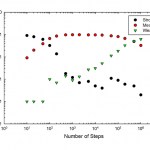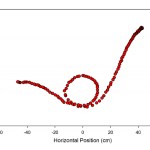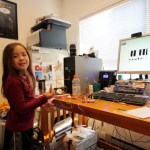Science
Over at Wired, Rhett has a post providing mathematical proof that he takes too many photos. As is traditional, he includes homework at the end of the post, specifically:
Now it is your turn. Find the number of photos you have taken each year. Is it possible for you to detect changes in your life by significant changes in the image rate? Maybe you purchased a new phone or had a new addition to your family which resulted in an increase in images. That would be cool if you could see that in your data.
Well, I can't really resist a challenge like that, so I went looking at my own photo…
Last week, the blog Last Word On Nothing did a piece on the best and worst sciences to write about, and the two writers tapping physics as the worst said things that were really disappointing to hear from professional writers. I nearly wrote an angry rant here in response, but Jennifer Ouellette covered it more diplomatically than I would've, so I opted to try for a more positive response over at Forbes: Four Reasons to Not Fear Physics.
Would've been better to get this out much earlier in the week, but it's the next-to-last week of the term, and I was buried in grading all this week, and it'…
I've frequently written about the "arrogance of ignorance," a phenomenon that anyone who's paid attention to what quacks, cranks, or antivaccine activists (but I repeat myself) write and say beyond a certain period of time will have encountered. Basically, it's the belief found in such people—and amplified in groups—that somehow they can master a subject as well or better than experts who have spent their entire professional lives studying the subject on their own, often just through the use of Google University and the echo chamber discussion forums that they frequent with their fellow…
When it comes to the use of what is sometimes called "complementary and alternative medicine" (CAM) or, increasingly, "integrative medicine," there is a certain narrative. It's a narrative promoted by CAM proponents that does its best to convince the public that there is nothing unusual, untoward, or odd about CAM use, even though much of CAM consists of treatments that are based on prescientific concepts of human physiology and pathology, such as traditional Chinese medicine or homeopathy. In other words, it's a narrative designed to "normalize" CAM usage (and therefore CAM practice), making…
Last week, I did a post for Forbes on the surprisingly complicated physics of a light bulb. Incandescent light bulbs produce a spectrum that's basically blackbody radiation, but if you think about it, that's kind of amazing given that the atoms making up the filament have quantized states, and can absorb and emit only discrete frequencies of light. The transition from the line spectra characteristic of particular atoms to the broad and smooth spectrum of black-body radiation is kind of amazing.
The way you get from the one to the other is through repeated off-resonant scattering. The…
Last year, I did several posts on what I consider to be a profoundly misguided and potentially harmful type of law known as "right-to-try." Beginning about a year and a half ago, promoted by the libertarian think tank known as the Goldwater Institute, right-to-try laws began popping up in state legislatures. I wrote about how these laws are far more likely to do harm than good, and that is a position that I maintain today. The idea behind these laws is to give terminally ill patients access to experimental drugs—in some cases drugs that have only passed phase I testing—that might help them.…
I was proctoring an exam yesterday in two different sections of the same class, so I had a lot of quite time. Which means I wrote not one but two new posts for Forbes...
The first continues a loose series of posts about the exotic physics behind everyday objects (something I'm toying with as a possible theme for a new book...), looking at the surprisingly complicated physics of an incandescent light bulb. A light bulb filament emits (to a reasonable approximation) black-body radiation, which is historically important as the starting point for quantum physics. But when you think about it, it's…
One of the highlights of teaching introductory mechanics is always the "karate board" lab, which I start off by punching through a wooden board. That gets the class's attention, and then we have them hang weights on boards and measure the deflection in response to a known force. This confirms that the board behaves like a spring, and you can analyze the breaking in terms of energy, estimating the energy stored in the board, and the speed a fist must have to punch through the board. As a sort of empirical test, we can drop a half-kilogram mass from the appropriate height to match the…
Epigenetics.
As I've described before, to alternative medicine practitioners, epigenetics seems to mean something akin to what the word "quantum" means: Magic. I've covered, for example, the woo-filled stylings of Deepak Chopra invoking things like "quantum consciousness," and seemingly for quite a few years the best way to slap a patina of "sciencey"-sounding credibility on a pseudoscientific medical treatment has been to add the word "quantum" to it. Perhaps the epitome of this tendency was the infamous Quantum Xrroid Consciousness Interface promoted by a rather—shall we say?—flamboyant…
The big social media blow-up of the weekend was, at least on the science-y side of things, the whole "boys with toys" thing, stemming from this NPR interview, which prompted the #GirlsWithToys hashtag in response. I'm not sorry to have missed most of the original arguments while doing stuff with the kids, but the hashtag has some good stuff.
The really unfortunate thing about this is that the point the guy was trying to make in the interview was a good one: there's an essentially playful component to science, even at the professional level. I took a stab at making this same point over at…
One of the points I make repeatedly in teaching introductory mechanics (as I'm doing this term) is that absolutely every problem students encounter can, in principle, be solved using just Newton's Laws or, in the terminology used by Matter and Interactions, the Momentum Principle. You don't strictly need any of the other stuff we talk about, like energy or angular momentum.
Of course, just because you can solve any problem using the Momentum Principle doesn't mean that you want to solve those problems that way. As an example of a problem that's really annoying to solve with just the Momentum…
Once again, the yearly autism quackfest known as Autism One is fast approaching. In fact, it will begin in Chicago tomorrow: five days of "autism biomed" quackery and antivaccine pseudoscience. Ever since the Great Schism in the autism antivaccine quackery community, which severed Generation Rescue from Autism One and ended Jenny McCarthy's run of being the keynote speaker every year, it just hasn't been the same. Well, not quite. It turns out that a lot of the speakers are still the same, Generation Rescue or not, Jenny McCarthy or not. Just take a look at the speaker list, and you'll see a…
It's been a long time since I bothered to care if readers know where I live or who I am. That's why when a newbie troll shows up in the comments, as newbie trolls periodically do, and castigates me for somehow being a "coward" or "hiding" my identity, I generally get a hardy laugh out of it. My retort is usually that my "real" identity is among the worst kept secrets in the skeptical blogosphere. And so it is. If a reader can't figure out who I am with one or two Google searches, truly he is too dim-witted for me to take seriously. Be that as it may, I now take particular interest in…
A few things about the academic job market have caught my eye recently, but don't really add up to a big coherent argument. I'll note them here, though, to marginally increase the chance that I'll be able to find them later.
-- First, this piece at the Guardian got a lot of play, thanks in part to the dramatic headline Science careers: doomed at the outset but even more thanks to the subhead "Has it become harder for graduate students to thrive, and are our best potential scientists giving up on academia?" Most of the people I saw re-sharing it used basically just that last clause, often…
Dedicated to lilady.
One of the disadvantages of writing for this blog is that sometimes I feel as though I spend so much time deconstructing bad science and pseudoscience in medicine that I'm rarely left with the time or the opportunity to discuss some interesting science. Of course, even when I do that, usually it's in the context of that very same bad science or pseudoscience, and this post won't be different. Still, there was some interesting science with respect to vaccines published last week in Science, and I think it's worth looking over. The only thing that surprises me is that the…
I've been sort of falling down on my obligation to promote myself-- I've written two blog posts for Forbes this week, and forgotten to post about them here. The first is a thing about philosophy in physics, and how Einstein illustrates both the good and bad aspects of a philosophical approach.
The second is a bit on the listicle side, looking at some types of diagrams that physicists draw when talking about physics. It's prompted by a ZapperZ post noting that scientists talking about science always draw pictures, but other subjects get by with just talking.
These are both quickly-dashed-off…
After having written yesterday's piece about the fallacy known as the appeal to nature, a favorite fallacy of the alternative medicine crowd. The idea that if something is somehow "natural" it must be superior to anything viewed as "unnatural" or "man-made" is deeply ingrained in pseudoscientific medicine. Heck, there's even a brand of quackery known as "naturopathy" because it supposedly utilizes the "healing power of nature" when in reality is takes what I sometimes call a "Chinese menu" approach to quackery; i.e., one from column A, two from column B, one from homeopathy, two from…
I've discussed on many occasions over the years how antivaccine activists really, really don't want to be known as "antivaccine." Indeed, when they are called "antivaccine" (usually quite correctly, given their words and deeds), many of them will clutch their pearls in indignation, rear up in self-righteous anger, and retort that they are "not antivaccine" but rather "pro-vaccine safety," "pro-health freedom," "parental rights," or some other antivaccine dog whistle that sounds superficially reasonable. In the meantime, they continue to do their best to demonize vaccines as dangerous, "toxin…
A couple of weeks ago, after one of my Forbes posts, I got contacted by a publicist working for Makey Makey. They really wanted publicity in Forbes, but that's above my pay grade; I did, however, say that it sounded like the sort of thing my kids would get a kick out of, and I could mention it here...
So, they sent me one. It's a small circuit board with a USB connector and a bunch of places for alligator-clip leads, and functions as an input device for the computer-- if you complete a circuit from one of the clip leads to ground, it records that as a mouse click, or a key press of some sort…
As hard as it is to believe, I've been spending a significant part of my time countering pseudoscience for close to 17 years, so long that it seems that I've always been doing it. Of course, that's not true; I didn't actually become involved in this seemingly never-ending Sisyphean task until I was in my mid-30s, which means that the majority of my life had been spent more or less blissfully ignorant that there are people out there who passionately believe, for example, that vaccines are dangerous and cause autism and that bleach enemas can reverse that autism or that there were quacks out…













